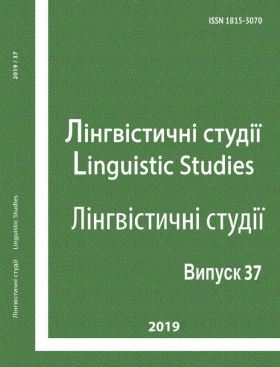The Level Model of Beauty Value in Phrasemics.
DOI:
https://doi.org/10.31558/1815-3070.2019.37.9Schlagworte:
evaluation, level of comprehension, level of significance, level of experience, phraseme, phrasemics, valueAbstract
In modern linguistics the theoretical and practical problems of concept «beauty» (Yu. Meshcheryakova, I. Okuneva, G. Sadrieva) and beauty value are actively developed (Zh. Krasnobaieva-Chorna). In the study, beauty value is positioned as a representative of the aesthetic level of the axiological world’s image.
The object of the article is beauty value. The subject of the article are phrasemes with evaluative semantics of ‘beauty’ in single-structured and multi-structured languages.
The beauty value in phrasemics are described by the method of parametric analysis of the phraseme semantic structure with accentuation of evaluative macrocomponent and the basic method of ideographic linguistics, the method of thematic fields.
Literaturhinweise
Arutjunova, Nina. Tipy jazykovyh znachenij: Ocenka. Sobytie. Fakt (Types of Language Values: Assessment. Event. Fact). M.: Nauka, 1988. Print.
Baeva, Ljudmila. Cennosti izmenjajushhegosja mira: jekzistencial'naja aksiologija istorii (Values of the Changing World: Existential Axiology of History). Astrahan': AGU, 2004. Print.
Bolshakov, Valeriy. Tsennosti kul'turyi i vremya (nekotorye problemy sovremennoy teorii ku'ltury) (Values of Culture and Time (Some Problems of the Modern Theory of Culture). Velikiy Novgorod: NovGU im. Yaroslava Mudrogo, 2002. Print.
Vyzhletsov, Gennadiy. Aksiologiya kul'tury (Axiology of Culture). SPb.: Izd-vo SPbGU, 1996. Print.
Krasnobaieva-Chernaya, Zhanna. “Opyt osmysleniya tsennostnoy kartiny mira vo frazeologii: strukturnaya organizatsiya (na materiale russkogo, ukrainskogo, angliyskogo i nemetskogo yazykov) (Experience of Understanding the Axiological World’s Image in Phraseology: a Structural Organization (Based on Russian, Ukrainian, English and German))”. Vestnik Tomskogo gosudarstvennogo universiteta. Filologiya (Bulletin of Tomsk State University. Philology) 54 (2018): 98–116. Print.
Krasnobaieva-Chorna, Zhanna. Linhvofrazemna aksiolohiya: paradyhmal’no-katehoriynyy vymir (Linguaphrasemic Axiology: Paradigmal-Categorical Dimension). Vinnytsia: TOV «Niland-LTD», 2016. Print.
Meshcheryakova, Yuliya. Kontsept «krasota» v angliyskoy i russkoy lingvokulturah (The Concept "Beauty" in the English and Russian Linguacultural). Diss. Volgograd: Volgograd State Pedagogical University, 2004. Print.
Okuneva, Irina. Kontsept «krasota» v russkom i angliyskom yazykah (The Concept "Beauty" in Russian and English). Moscow: M. Lomonosov’ Moscow State University, 2009. Print.
Sadrieva, Guzel. Ustoychivyie obraznyie sredstva, reprezentiruyuschie kontsept «krasota», v angliyskom, russkom i tatarskom yazyikah (Stable Figurative Means Representing the Concept "Beauty" in English, Russian and Tatar Languages). Kazan: Tatar State Humanitarian and Pedagogical University, 2007. Print.
Stolovich, Leonid. Krasota. Dobro. Istina: Ocherk istorii esteticheskoy aksiologii (Beauty. Good. Truth: Essay on the History of Aesthetic Axiology). Moscow: Respublika, 1994. Print.
Tugarinov, Vasiliy. “Krasota kak tsennost (Beauty as a value)”. Izbrannyie filosofskie trudyi (Selected Philosophical Works). L.: Izd-vo Leningradskogo un-ta, 1988. 162–165. Print.


